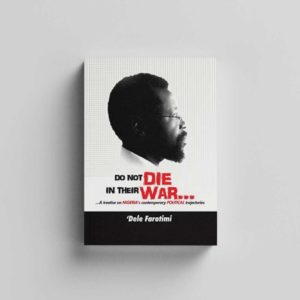Silence no Longer an Option. I cannot find peace in keeping quiet. It has pleased God to burden me with the knowledge of the truth…
I have always had a social conscience; I believe this to be a by-product of my childhood; the society in which I spent my formative years; and on a God-given sensitivity to the sufferings of the poor masses of the Nigerian people.
I was born to a civil servant father, and a mother who, in order to raise her children, sold everything except her body. My parents were divorced before my second birthday, and I grew up with my grandmother in my grandparents’ home at
Inalende in Ibadan. I come from humble beginnings. We were not poor, but I never went hungry and there was never any form of deprivation, nor were there any hints of creditors lurking around to collect a debt. Mine was a happy, contended childhood, spent cocooned in my grandmother’s love.
There were no nursery schools for anyone in my neighbourhood;we all attended what were called “Je lẹ́ ó sin’mi” loosely translated as “let those at home have peace”. These were the forerunners of today’s crèches and playgroups. We went equipped with our slates and chalks. Mine was at the basement of what I remember as ‘Church Eleja’ in Adamasingba quarters of Ibadan. We would walk in a single file from Inalende to Adamasingba and back; lunch was served at the school and the days were spent learning the alphabets and numbers.
They were happy days.
I graduated to St. Stephen’s Primary School at Inalende. This was just across the road from my grandfather’s house, where I lived. In my youth, you got to play the postcode lottery when it was time to go to school. The state would place you in the school closest to your home. It did not matter who your parents were, or how much money they had or did not have; the system ensured that you went to the school closest to your home; and thanks to the government, primary school education was compulsory and free.
In 1977, my mother returned to Nigeria from the United States of America, and I left my grandmother’s care to live with my mother. She had rented a house at Ojoo, in the outskirts of Ibadan, and I was transferred to Abadina Primary School. Abadina was built by the management of the University of Ibadan to cater primarily for the children of the junior staff who lived mostly in Abadina Village. I flowered in this rustic bucolic environment, and developed a love for books and comics. I read for the sheer pleasure of reading and became a fixture in the children’s library next to the Conference Centre. I was a happy child.
In 1978, I wrote the entrance examination into Fiditi Grammar School located in Fiditi, my maternal grandparent’s ancestral home, whilst yet in Primary five, and was admitted. I was ten years old when I left the cocoon of home to embrace my future.
The years went by in a blur and upon graduating in 1983; I passed enough papers to enter Olivet Grammar School in Oyo for Advance Levels, but not enough to enter the university. A further sojourn to Oyo State College of Arts and Sciences (OSCAS) in in Ile Ife a year later and I was in 1985 offered admission into Lagos State University (LASU) to read English Language and Linguistics. I would graduate in 1997 – 12 years later – with a degree in Law.
The biographical exercise is necessary in order to provide context for how I have come to arrive where I am today. I cannot find peace with continuing to keep quiet, because it has pleased God to burden me with the knowledge of the truth. Nigeria was better than this, and can be much better than it has become.
My biography mirrors that of most others from my generation. Our parents did not have to be rich, and, or educated, in order for us to get good education. The system worked to deliver value to everybody, and class mobility was a declared goal of government. You may be born to economically disadvantaged parents, but your capacity for upward mobility was not constrained by this; your trajectory was a function of your own willingness to work, and your individual aptitude.
Today, the goal of government appears to be aimed at the segregation of citizens along class lines, and opportunities for class mobility have been strangulated. Nigeria has become a feudalistic entity where the circumstances of a man’s birth determine his future.
Why am I speaking out today?
What do I hope to achieve by raising my voice at a time when the majority appears to be celebrating the Eldorado we had announced upon the coming of our latest set of Messiahs, led by the agent of change himself, President Muhammadu Buhari?
Mine is a generation defined by cowardice. Once upon a time in this country, we had the like of Gani Fawehinmi, Beko Ransome-Kuti, Tai Solarin and a plethora of others with social consciences. These men and women spoke for those without voices; they did not do so for personal gains; some did it at the cost of personal liberty and lost economic benefits because of their commitment to the betterment of the society. Many were jailed, assaulted several times, physically and emotionally, and their means of livelihood were destroyed. They spoke truth to power in the ages of the ‘unknown’ soldiers, and were physically brutalized with impunity.
Of the tribe of these men and women of conscience, only very few remain, and to witness what age has done to the like of Wole Soyinka; to be confronted with the guilt I feel at my anger over his inability to continue to speak for my cowardly generation, left me no choice but to free myself of the burden of silence, enforced by the cowardly need to blend into the scenery.
I have watched as Professor Soyinka rightly man the barricades, my entire lifetime. I have observed the many sacrifices and prices he has paid for daring to speak truth to power. He has been imprisoned for being true to his conscience. He has suffered exile and forced separations from his loved ones and several other deprivations that only he can talk about. He has paid a very high price for the ideals he has lived for. He has not taken the easy roads.
But in recent years, I have found myself becoming increasingly alarmed at the convenient and Wengerian (Arsene) dimensions of his selective criticisms of our political elite. I have applauded as Soyinka took on Goodluck Ebele Jonathan and his co-travellers, Obasanjo and of course, Babangida, and I have waited in vain to hear him say something about the serial malfeasance of the thieves closer to home. I have waited in vain.
For a reason, I was angry with the hero of my youth, but I have since come to the point of realization. Professor is now an old man, he has fought for over 60 years. He is entitled to live out his dotage on his own terms, and it is up to us to embrace our own truths, and speak up as he has eloquently spoken up for our entire lifetimes.
Is it accidental that nobody in my generation has acquired the capacity to speak as the men in my hero’s generation? I think not. I believe that we are all products of the environment that nurtures us, and Professor’s generation was imbued with a sense of purpose that seems completely obliterated in my own generation. Professor’s generation had a surplus of men with the capacity to dream, idealists who had big dreams for the Nigeria State.
The first coupists, Kaduna Nzeogwu et al., Fela Anikulapo, Gani Fawehinmi — that generation had several dreamers and original thinkers. My own generation on the other hand, is replete with survivalists; peopled with men and women who have become experts in existential living; the art of compromises, even with their own consciences, and the pursuit of personal wealth at the expense of corporate poverty.
My generation has no vision of the Nigerian State; we grew up during and after the Civil War. We were either Hausa, Yoruba, Igbo, Edo and so on; we were anything but Nigerians, and not believing in the Nigeria State, we pursued individual and personal aggrandizements. There were periodic and episodic identifications with the Nigeria State, but being unfortunate to have lived as young adults under the several kleptocratic regimes headed by the military, we had no high ideals to live up to, no windmills to charge, and idealistic dreams died quickly in the economic maelstrom that witnessed our youthful years. We are the worst that the Nigeria State has thrown up, existential in outlook, bankrupt in morals.
We are raising children who cannot survive in the country that we will bequeath to them, if things are not quickly reversed. It is this harsh reality that has now loosened my tongue and woken me from inertia. My purpose is to sound the alarm in the hope that we have not travelled too far down this road towards national destruction and we can do a course correction before it is too late.
Silence is no longer an option.
Excerpted from the book – Do Not Die In Their War (Published May, 2019)
The post WHY NOW? – Silence no Longer an Option appeared first on Dele Farotimi.



